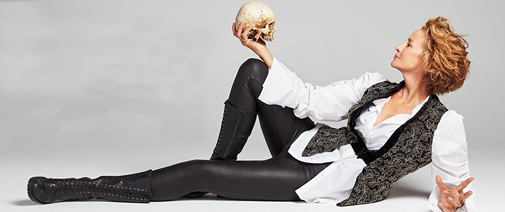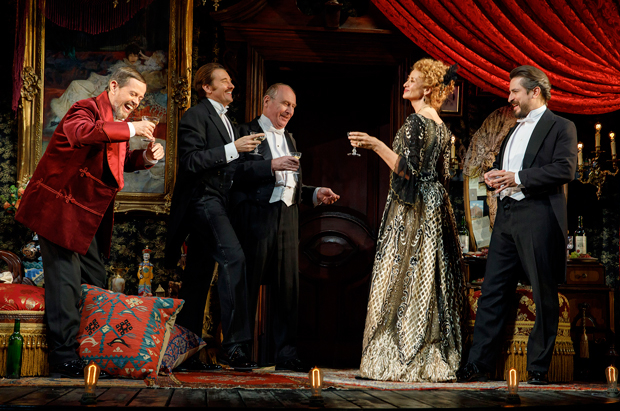by Dancin' Dan

It's a tall enough order to write a play about one of the greatest actresses the world has ever known. It's quite another to write a play about that same actress taking on one of the most famous plays ever written. But Theresa Rebeck has never been one to back away from a challenge. Her delightful new play Bernhardt/Hamlet imagines what it must have been like for the great Sarah Bernhardt to assay the role of none other than Hamlet, all the way back in 1897. To say the least, it was difficult.
Bernhardt (Janet McTeer), in her fifties, was past the point where she could believably play the dying ingénues that made her famous (and also far past the point where she wanted to). Out of money but full of ambition, she decides that Shakespeare's melancholy Dane will be her vehicle for a comeback after her last play, written by Edmond Rostand (Jason Butler Harner), flopped with audiences despite love from critics. But she is having difficulty "finding" the Prince, frustrated by his ease with flowery verse and his inability to take action.
Can a powerful woman play a powerful man? Bernhardt is absolutely sure of it. She says...
"A young actor of, what, twenty cannot understand the philosophy of Hamlet. An older actor no longer looks the boy. The woman more readily looks the part and feels the part, yet has the subtleness of mind to grasp it."
But the men in her life are less sure, and not because of her talent. No, what truly flusters Rostand, graphic artist Alphonse Mucha (Matthew Saldivar), and theater critic Louis (Tony Carlin) is the idea of a woman having the power of a man. They cannot believe that she will succeed, because doing so would be to admit that a woman could be the equal of a man. They all love Berhardt in their own way (Rostand, especially, as he is having an affair with her), but they cannot, they will not, concede this point: She may be the world's greatest actress, but, as Louis says, "a woman with power is a freak."
The more things change, the more things stay the same.

It's a man's world, it always has been, and the only men who seem to support Bernhardt's pursuit of Hamlet fully are her fellow actors, who must deal with her many, many moods and constant changing of rehearsal scenes and blocking. But for all her diva airs, Bernhardt was the greatest actress of her day for a reason. In one particularly brilliant scene, she sits down castmate Constant Coquelin (Dylan Baker), playing Hamlet's father for the first time (after having played the title role many times over), to do some exercies to help both of them find their characters, and it is the stuff of magic. Bernhardt is asking questions of Hamlet that a man would never think to ask, and Rebeck uses this to create a scene of touching beauty, one of the few where we truly get to see what Bernhardt's performance would have looked like.
Much like Hamlet, Bernhardt/Hamlet would be nothing without a great lead. And in Tony-winner and two time Oscar nominee Janet McTeer, it has found one. McTeer finds every nook and cranny in Rebeck's version of Bernhardt, turning on a dime from haughtiness to humility, from despair to righteous fury, from hardness to softness, while making sure this all feels like it's coming from the same person. It is a dazzling performance to watch. Mcteer is so good, in fact, that she makes you willing to completely forgive the wrong-headed turn the play takes in its second act, including its frustrating non-ending.

In the second act, Rebeck becomes less and less interested in the specific challenge Bernhardt set for herself, and more interested in her place in the world as a powerful woman. This does lead to one laser-sharp scene where Bernhardt storms through a reading of her lover's latest play, supposedly written about her and for her, and rips it to shreds for having her yet again as the ingénue (in case you were wondering how many of these people were real historical figures, Rostand did in fact have a big hit play in 1897, starring Coquelin, the title of which I will not spoil here). But it has the ultimate effect of making the play less satisfying, denying us the opportunity to see what exactly Bernhardt got out of all this, other than having a success in the part.
Still, Rebeck has written a sharp, funny script, and director Moritz von Stuelpnagel stages it with a minimum of fuss to put the emphasis right where it belongs: On the words. Baker, Butler Harner, and Saldivar each play their parts perfectly, and in her one scene, Ito Aghayere very nearly steals the show as Rostand's wife Rosamond. But this production is Janet McTeer's from beginning to end, and she is having the time of her life sinking her teeth into this meaty part. Her dexterity with the language - both Shakespeare's and Rebeck's - is marvelous, but her physical dexterity is almost more impressive, charting Bernhardt's oft-conflicting emotions with a graceful ease even at her most manic. It's wondrous work, worthy of the Divine Sarah herself.

Recent Stage Reviews:
- Harry Potter and the Cursed Child (open run)
- Disney's Frozen (open run)
- Boylesque Bullfight - just closed yesterday :*(
- Desperate Measures - just closed yesterday :*(